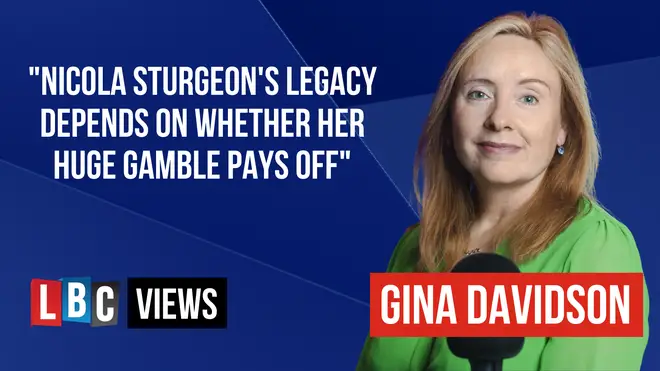
Nick Abbot 10pm - 1am
1 July 2022, 16:56

For years Nicola Sturgeon has been clear on why she believes Scotland should be an independent country - the problem she has faced since 2014 is how to deliver on her promises of a second independence referendum.
But since she declared two weeks ago that all would be revealed before the Scottish Parliament broke for summer recess, there has been feverish speculation about what she would say.
The big money was on some kind of fudge on the question, not to ask directly if Scotland should be independent, but if her government should open negotiations with the UK government to start that process. That form of words would perhaps not fall foul of Holyrood's devolved powers, it was suggested.
Well she wrong-footed everyone. And there wasn't just one rabbit pulled from the hat, but a litter of them.
She said her government was publishing a Scottish Independence Referendum Bill, that she wanted the vote to take place on October 19 next year and that it would be the same yes or no question as last time.
And she had written to Boris Johnson - again - requesting a Section 30 Order in the hope that the whole process could be conducted in the same fashion as in 2014.
Of course the Prime Minister has consistently refused to grant one - and there’s no chance of that changing anytime soon.
So pre-empting all of that, and getting ahead of any potential legal challenges, she also revealed that the Lord Advocate had agreed to write to the Supreme Court seeking its views on the matter first - after all it's likely that's where her Bill would end up eventually.
If that wasn't enough to have independence supporters overwhelmed with excitement, she revealed that should the court refuse to allow her to have a referendum, then the next General Election would be fought on the sole issue of independence for Scotland. And a majority vote in favour (50% + 1) would be enough to trigger independence talks. No need for a referendum at all.
Unsurprisingly for Yes voters it felt as if all their Christmasses had come at once. Many defunct Yes groups suddenly sat up and shook off eight years of dust.
Undoubtedly Nicola Sturgeon's announcement felt as if something had changed, but in the cold light of day, it really hasn't moved the dial towards her goal one iota. She has pulled the trigger from the grenade and given it a good throw - but it could yet blow up in her face.
For a start, one rather large fly in the ointment with the Supreme Court is not necessarily that it will say no outright to the Scottish Parliament having the power to lodge the referendum Bill and hold a vote without the UK government's support, which it could, but that it just says it has no place judging a hypothetical piece of legislation: get it published, bring on the legal challenges and then it will decide.
Such a move would derail her timetable of a referendum by next October somewhat considerably and could still end up in a flat no at the end of the day.
Secondly, a more midge-sized issue - but one that is just as annoying and could leave some rather sore wounds - is that papers setting out the case for independence are yet to come, including the thorny issues of currency, EU membership, trade and borders, pensions - all the things that tripped up the SNP eight years ago.
While opinion polls put the Yes camp on a far higher starting point than in 2014, the nitty gritty of the campaign detail may well see that drop off, especially as people deal with the financial worries of the current cost of living crisis.
Thirdly, the idea of using a General Election as a "de facto referendum" is a piece of political theatre but doesn't stand up to much scrutiny. Professor James Mitchell of Edinburgh University says the two different votes are very distinct beasts and further it was "not for a political party to dictate the terms of an election".
It also goes against Nicola Sturgeon's desire to have independence delivered in a format that is unarguable - and it is only a referendum that would deliver that result, if she won.
To use people's votes in an election where they voted on a variety of issues rather than just one, feels somehow dishonest. It could lead to extreme tactical voting - and it takes the wind right out the sails of the other pro-independence party, her government colleagues the Scottish Greens who have never got anywhere in a first past the post system.
It is also worth noting that even when the SNP won 56 out of Scotland's 59 MPs it never broke the 50% vote share mark. The franchise in a General Election is also not favourable to the SNP. There are no 16 and 17 year old votes to court, no foreign nationals or refugees, the "new Scots" as they are termed. So the bar she has set is so high Sergey Bubka would struggle to get over it.
No doubt the news of using a General Election in such a way will have warmed the cockles of the hearts of those who have been desperate to hear of a Plan B in the face of UK government intransigence - but for many SNP MPs it will perhaps have made them gulp.
It also paved the way for Scottish Labour leader Anas Sarwar to accuse her of trying to find relevance in an election which he says would be about Conservative versus Labour, Johnson versus Starmer.
What is for sure though is that Nicola Sturgeon has surprised everyone with a rather bolder move than was expected. It is a huge gamble and one on which her legacy will depend.